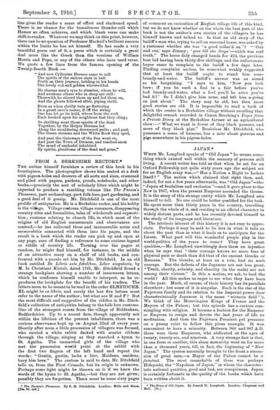FROM A BERKSHIRE RECTORY.*
THE author himself furnishes a review of this book in his frontispiece. The photographer shows him seated at a desk with pigeon-holes and drawers of all sorts and sizes, crammed and piled with papers, packets, proofs, notebooks, and other books,—precisely the sort of scholarly litter which might be expected to produce a rambling volume like The Parson's Pleasance, part archaeology, part folk-lore, part gardening, and a good deal of it gossip. Mr. Ditchfield is one of the most prolific of antiquaries. He is a Berkshire rector, and his hobby is the village. Village customs, village romances, disappearing country rites and formalities, tales of witchcraft and supersti- tion; customs relating to church life, in which most of the origins of old English amusements and observances are centred,—he has collected these and innumerable notes and memorabilia connected with them into his pages, and the result is a book which the reader can pick up and open at any page, sure of finding a reference to some curious legend or riddle of country life. Turning over the pages at random, he might find himself, for instance, in the middle of an attractive essay on a shelf of old books, and con- fronted with a puzzle set him by Mr. Ditchfield. In an old book entitled De his-is sail; fcrtalibus, Liber singularis, by M. lo Christiani Klotzii, dated 1761, Mr. Ditchfield found a strange bookplate showing a number of interwoven letters, which he confesses himself unable to interpret, so he re- produces the bookplate for the benefit of his readers. The letters seem to be meant to be read in the order ELHFIOCEIR. EL might be ex libris, and surely the last five letters must refer to the name of the author ; but what are H and F ? But the most difficult and suggestive of the riddles in Mr. Ditch. field's collection of antiquities belong to the folk-lore customs. One of the strangest comes from the village of Biddenham, Bedfordshire. Up to a recent date, though apparently not within the lifetime of the present inhabitants, there was a curious observance kept up on August 22nd of every year. Shortly after noon a little procession of villagers was formed, who carried a white rabbit decked with scarlet ribbons through the village, singing as they marched a hymn to St. Agatha. The unmarried girls of the village who met the procession would point at the rabbit with the first two fingers of the left hand and repeat the words : " Gustin, gustin, lacks a bier, Maidens, maidens, bury him here." The custom is said to date, Mr. Ditch field tells us, from the First Crusade, but its origin is unknown. Perhaps some light might be thrown on it if we knew the words of the hymn to St. Agatha,—but they are not given; possibly they are forgotten. There must be some sixty pages
-• The Parson's Pleasance. By P. H. Ditchfield. London: Mills and Boon. [108. 6d. not.]
of comment on curiosities of English village life of this kind, but we do not know whether on the whole the best part of the book is not the author's own stories of the villagers he has himself known and talked to. Is that an old story of the bailiff's man who, trying to sell an unsound horse, was asked by a customer whether she was "a good collar'd un "? "'Out and out,' says Jimmy ; 'goes till she drops'—which was real truth." The horse duly changed hands for L'24, the previous best bid having been thirty-five shillings, and the unfortunate buyer came to complain to the bailiff a few days later. Finding complaint useless, he somewhat weakly suggested that at least the bailiff ought to stand him some brandy-and-water. The bailiff's answer was as sound as his bargaining. "I says to him, Now you look here ; if you be such a fool in a fair before you've had brandy-and-water, what a fool you'll be arter you've had it ? ' So I didn't give him none, and left him a-going on just about." The story may be old, but then most good stories are old. It is impossible to read a book of which the centre is a Berkshire village without recalling that delightful remark recorded in Canon Beeching's Pages from a Private Diary of the Berkshire farmer at an agricultural show :—" What we want is fewer of they black passons, and more of they black pigs." Doubtless Mr. Ditchfield, who possesses a sense of humour, has a note about parsons and pigs somewhere in his pigeon-holes.










































 Previous page
Previous page